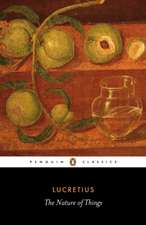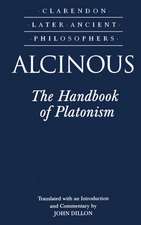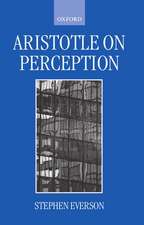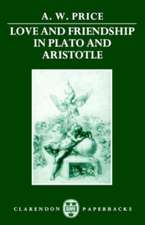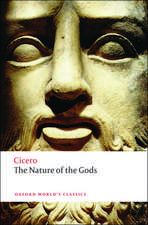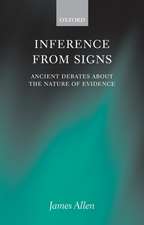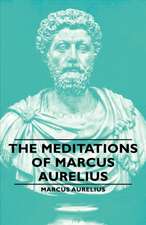The History and Philosophy of Science: A Reader
Editat de Daniel McKaughan, Dr Holly VandeWallen Limba Engleză Paperback – 10 ian 2018
| Toate formatele și edițiile | Preț | Express |
|---|---|---|
| Paperback (1) | 263.52 lei 3-5 săpt. | |
| Bloomsbury Publishing – 10 ian 2018 | 263.52 lei 3-5 săpt. | |
| Hardback (1) | 857.55 lei 6-8 săpt. | |
| Bloomsbury Publishing – 10 ian 2018 | 857.55 lei 6-8 săpt. |
Preț: 263.52 lei
Preț vechi: 298.12 lei
-12% Nou
Puncte Express: 395
Preț estimativ în valută:
50.42€ • 52.79$ • 41.72£
50.42€ • 52.79$ • 41.72£
Carte disponibilă
Livrare economică 15-29 martie
Preluare comenzi: 021 569.72.76
Specificații
ISBN-13: 9781474232722
ISBN-10: 1474232728
Pagini: 1104
Dimensiuni: 169 x 244 x 62 mm
Greutate: 1.96 kg
Editura: Bloomsbury Publishing
Colecția Bloomsbury Academic
Locul publicării:London, United Kingdom
ISBN-10: 1474232728
Pagini: 1104
Dimensiuni: 169 x 244 x 62 mm
Greutate: 1.96 kg
Editura: Bloomsbury Publishing
Colecția Bloomsbury Academic
Locul publicării:London, United Kingdom
Caracteristici
Features an introduction to each section together with suggestions for further reading, end-of-section discussion questions, a timeline and glossary of key terms
Notă biografică
Daniel J. McKaughan is Associate Professor in the Department of Philosophy at Boston College, USA.Holly VandeWall is Assistant Professor of the Practice of Philosophy in the Department of Philosophy at Boston College, USA.
Cuprins
Timeline Introduction, Daniel J. McKaughan and Holly VandeWallPart I. ANCIENT AND MEDIEVAL NATURAL PHILOSOPHY AND MATHEMATICS Introduction Plato, Philebus Plato, Republic Plato, Timaeus Lucretius, On The Nature of Things Aristotle, CategoriesAristotle, Posterior Analytics Aristotle, Physics Aristotle, On the Heavens Aristotle, Meteorology Aristotle, De Anima Aristotle, Parts of Animals Aristotle, Generation of Animals Euclid, Elements Apollonius, The Conics Ptolemy, Introduction to the Almagest Avicenna, De Mineralibus Al-Biruni, Letters to Avicenna on Aristotelian Astronomy and Physics Aquinas, On the Motion of the Heart Buridan, Questions on Aristotelian PhilosophyOresme, A Treatise on the Configuration of Qualities and Motions Suggested Readings Discussion Questions Part II. TRANSFORMATIONS IN THE PHILOSOPHY OF NATURE: MECHANICS AND ASTRONOMY Introduction Copernicus, On the Revolutions of the Celestial SpheresOsiander, Preface to On the Revolutions Tycho Brahe, Preface to The Improved Mechanic Astronomy Kepler, Astronomia Nova Galileo, Message to Cosimo de'Medici Galileo, Dialogue Concerning the Two Chief World Systems Galileo, Dialogue Concerning the Two New Sciences Descartes, Discourse on Method Descartes, Principles of Philosophy Descartes, Le MondeBacon, The New Organon Bacon, The New Atlantis Newton, Principia Huygens, Treatise on Light Newton, Opticks Newton, Letter to Oldenberg Buffon, On the Formation of the Planets Suggested Readings Discussion Questions Part III: TRANSFORMATIONS IN THE PHILOSOPHY OF NATURE: CHEMISTRY, HEAT, AND THE UNIFICATION OF FORCES Introduction Hermes Trismegistus, The Emerald Tablet Paracelsus, Of the Nature of Things Newton, The Key and Commentary on the Emerald Tablet Boyle, On the Excellency and Grounds of the Corpuscular or Mechanical Hypothesis Boyle, Experimental Researches on Combustion Boyle, The Sceptical Chymist Becher, Concerning the First Principle of Metals and Stones Stahl, Preliminaries Priestley, Of Dephlogisticated Air Lavoisier, Elements of Chemistry Young, On the Theory of Light and Colors Dalton, A New System of Chemical Philosophy Gay-Lussac, Memoir on the Combination of Gases Avagadro, Determining Relative Masses of Elementary Molecules Oersted, The Electromagnetic Effect (4 pages)Faraday, Lectures on Electricity and Magnetism Faraday, Experimental Researches in Electricity Carnot, Reflections on the Motive Power of Fire Clausius, On the Nature of the Motion We Call HeatMaxwell, A Dynamical Theory of the ElectroMagnetic Field Canizzaro, Sketch of a Course of Chemical Philosophy Mendeleev, Relation between Properties and Atomic Weights Kelvin, On the Dynamical Theory of Heat Suggested Readings Discussion Questions Part IV: THE SPECIALIZATION OF NATURAL HISTORY: THE HUMAN ANIMAL, ZOOLOGY, BOTANY, AND GEOLOGY Introduction William Harvey, Concerning the Movement of the Heart and Blood Descartes, Treatise on Man Hooke, MicrographiaSchwann, Microscopical Investigations Buffon, Natural History "Second Discourse" Buffon, On the Generation and Species of Animals Linnaeus, On the Increase of the Habitable Earth Linnaeus, Economy of Nature Cuvier, On the Revolutions of the Earthly Globe Lamarck, Zoological Philosophy Cuvier, Lectures on Comparative Anatomy and Natural History of Fishes Lyell, Principles of Geology Paley, Natural Theology Malthus, An Essay on the Principle of Population Mendel, Experiments in Plant HybridizationSuggested Readings Discussion Questions Part V. EVOLUTIONARY THEORY: DARWINISM AND ITS RECEPTION Introduction A. R. Wallace, On the Tendency of Varieties to DepartDarwin, The Origin of Species Darwin, Descent of Man Darwin, Variation of Plants and Animals "Pangenesis"Kelvin, On the Age of the Earth: Uniformity Briefly Refuted and Of Geological Dynamics Jenkin, Review of the Origin of the Species Sedgwick, Objections to Mr. Darwin's Theory Owen, Darwin on the Origin of Species Gray, Darwin and His Reviewers Agassiz, Methods in the Study of Natural History Huxley, T. H., The Coming of Age of the Origin of Species Suggested Readings Discussion QuestionsGlossaryIndex
Recenzii
This collection aptly unites, and thematically arranges, some of the most important sources in the history of the biological and physical sciences from antiquity through the end of the 19th century. The volume is designed for use in upper division or graduate history and philosophy of science courses and affords instructors ready access to key texts from a near-comprehensive range of time periods. The book stops before the 20th century, but this limitation ensures that the sources it includes are broadly accessible to students without advanced scientific training. The selection of sources is careful, and the translations (where applicable) are fluid ... Summing Up: Recommended. Advanced undergraduate and graduate students and their instructors.
McKaughan and VandeWall set off on a difficult quest: to bottle two millennia of our species' best thoughts about the world and our place in it into a single collection, to do it without overwhelming the new reader with a deluge of opaque material, to cover the ever-expanding panoply of disciplines and practices, and through it all to not lose sight of that humbling sense of wonder at nature that our ancestors experienced and that we who stand on the shoulders of giants would do well to remember. I can't wait to share this with my own students.
Can an education in the history & philosophy of science be distilled into a single volume? The McKaughan & VandeWall anthology has done so. It reflects the conviction that historians of science ought to be well trained as philosophers of science and vice versa. This collection is an extremely rich resource for both encountering science (natural philosophy) as it really was and for discerning progress. It samples generously from oft-neglected eras, regions, disciplines, and authors. Having designed a course in the history & philosophy of science myself, I really appreciate this book.
McKaughan and VandeWall set off on a difficult quest: to bottle two millennia of our species' best thoughts about the world and our place in it into a single collection, to do it without overwhelming the new reader with a deluge of opaque material, to cover the ever-expanding panoply of disciplines and practices, and through it all to not lose sight of that humbling sense of wonder at nature that our ancestors experienced and that we who stand on the shoulders of giants would do well to remember. I can't wait to share this with my own students.
Can an education in the history & philosophy of science be distilled into a single volume? The McKaughan & VandeWall anthology has done so. It reflects the conviction that historians of science ought to be well trained as philosophers of science and vice versa. This collection is an extremely rich resource for both encountering science (natural philosophy) as it really was and for discerning progress. It samples generously from oft-neglected eras, regions, disciplines, and authors. Having designed a course in the history & philosophy of science myself, I really appreciate this book.

